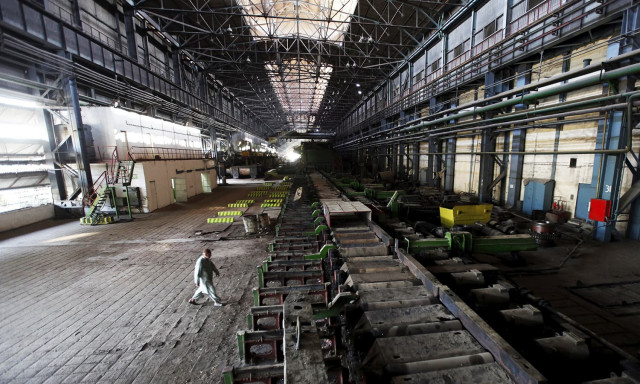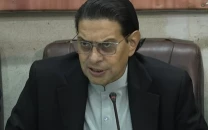Top court resumes hearing petition against halting privitisation of Pakistan Steel Mills
Mian Saqib Nisar formed a nine-member larger bench on March 3

PHOTO: REUTERS
The nine-judge bench headed by Chief Justice of Pakistan Mian Saqib Nisar on Tuesday resumed the hearing of the case.
Khalid Anwar, counsel for one of the petitioner appeared before the bench and stated that the case was dismissed when he was on general adjournment. Upon this, the bench restored the review petition.
Mian Saqib Nisar formed a nine-member larger bench on March 3.
Other members of the bench are Justice Asif Saeed Khosa, Justice Ejaz Afzal Khan, Justice Dost Muhammad Khan, Justice Umar Ata Bandial, Justice Maqbool Baqar, Justice Faisal Arab, Justice Ijazul Ahsan and Justice Sajjad Ali Shah.
Earlier in February, while hearing a case, the chief justice had asked senior lawyer Khalid Anwar about his opinion regarding the Supreme Court’s 2006 judgment that halted the privatisation of the PSM. The counsel had replied that it was a ‘bad’ verdict.
On behalf of one respondent, the counsel had filed a fairly comprehensive review petition but it was dismissed in his absence as he was on general adjournment.
Upon this, the chief justice asked the Registrar Office to place the file of the case before him.
Larger bench formed to revisit decision on privatisation of Pakistan Steel Mills
The larger bench will take up plea for the restoration of the review petition.
A section of lawyers believes that the judgment on the PSM should be revisited. The country is currently losing billions of rupees due to the Supreme Court’s 2006 ruling.
Prime Minister Shahid Khaqan Abbasi gave a formal go-ahead for the privatisation of two major yet loss-making entities — Pakistan International Airlines and the Pakistan Steel Mills — apparently on the pretext of ‘restructuring’.
He granted the related approval while presiding over a meeting of the Cabinet Committee on Privatisation (CCoP) at the Prime Minister’s Office.
Though the superior judiciary, led by Justice Nisar, is under criticism due to some key judgments pertaining to political matters, it is also being praised for not interfering in the country’s financial issues.
In the past, the Supreme Court’s interference in financial matters negatively affected the country’s position before international courts.
Similarly, Pakistan is suffering from damages worth billions of rupees due to the court’s intervention in different financial deals with foreign companies.
Even during the hearing of a plea against the LNG contract, the chief justice observed that the Supreme Court did not want to repeat the episode of Reko Diq and the PSM wherein the country suffered huge financial losses due to court intervention.
Subsequently, he referred to the Karkey’s rental power plant project case, wherein the International Centre for Settlement of Investment Disputes (ICSID) awarded Rs80 billion worth of damage to Pakistan.
It is to be noted that ICSID in its award also asked serious questions on the conduct of the Supreme Court.
Meanwhile, the CJP has directed fixing the case SMC No 17/2015 (health issues in Pakistan) in the third week of March.



















COMMENTS
Comments are moderated and generally will be posted if they are on-topic and not abusive.
For more information, please see our Comments FAQ